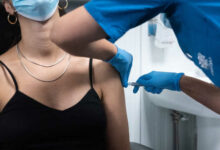Trudeau announces plan to purchase 76 million doses of Canadian-made COVID-19 vaccine

Prime Minister Justin Trudeau today announced another contract to buy a promising COVID-19 vaccine now in development — part of a plan to secure millions of vaccine doses to inoculate Canadians from the novel coronavirus.
Trudeau said the government has signed a contract to procure 76 million doses from the Quebec City-biotech company Medicago.
Medicago is developing the vaccine in partnership with the British drug company GlaxoSmithKline. The two companies have said its pre-clinical results show the vaccine demonstrated a “high level of neutralizing antibodies following a single dose.”
If the vaccine also performs well in a clinical setting, the companies are on track to make it available in the first half of 2021. Medicago has said it has the manufacturing capacity to produce as many as 100 million doses in 2021.
The federal government is spending $173 million to help Medicago develop the vaccine and build a large plant in Quebec to produce it. Trudeau also announced a $18.2 million investment in Vancouver-based Precision NanoSystems, which offers technology to produce vaccines and therapeutic drugs.
Canada already has signed contracts for tens of millions more vaccine doses with other pharmaceutical giants, such as AstraZeneca, Moderna and Pfizer. All told, the federal government has secured 358 million doses of the COVID-19 vaccine — an insurance policy if some of the vaccines in development prove to be ineffective in clinical trials.
“We are coming at this from every angle,” Trudeau said.
This massive procurement effort is aimed at ensuring there will be enough vaccine doses on hand for all Canadians who want them, although a timeline for delivery is not yet certain. No COVID-19 vaccine has been approved for use in the western world.
When asked for a more precise timeline on when the vaccines will be available in Canada, Trudeau said there’s still much more work to do to ensure a vaccine candidate is safe to use.
Trudeau said he’s hopeful that vaccines can be deployed in the early part of 2021. He said that, to start, front line health care workers and vulnerable populations, such as seniors living in long-term care homes, will have priority access.
“Nothing will be distributed in Canada until Health Canada is absolutely certain that the safety of Canadians is being properly covered and taken care of,” Trudeau said.
“We were hoping that the vaccines would arrive yesterday, but they won’t. There’s still more months of work to do. We all want to get this crisis behind us as quickly as possible. We’re working on a vaccine safely, responsibly and quickly.”
Trudeau also detailed the government’s plan to deploy rapid tests throughout the country — devices that health experts say could lessen the burden on lab-based testing in this country as cases continue to climb.
Trudeau said trucks full of Abbott Laboratories’ Panbio COVID-19 Rapid Test devices are out today distributing tens of thousands of tests to the provinces and territories. Another Abbott product, the ID NOW, arrived in Ontario yesterday, Trudeau said.
Trudeau said it will now be up to provinces to determine how to use these tests as part of a larger testing strategy.
“Access to rapid tests will vary across the country depending on the province in question. Rapid tests have advantages but also disadvantages, and need to be part of a whole strategy of testing and tracing,” Trudeau said, adding that the federal government’s function is to simply buy and distribute them to the jurisdictions charged with administering health care.
Ontario Premier Doug Ford and other provincial leaders have encouraged Health Canada regulators to quickly approve such devices so tests can be deployed to airports, high-risk workplaces, long-term care homes and schools, among other settings.
The regulator has so far approved four point-of-care molecular testing devices and an antigen test, which detects the presence of viral proteins in biological samples. These tests are destined for health care settings like doctors’ offices, pharmacies and walk-in clinics.








Redes Sociais - Comentários